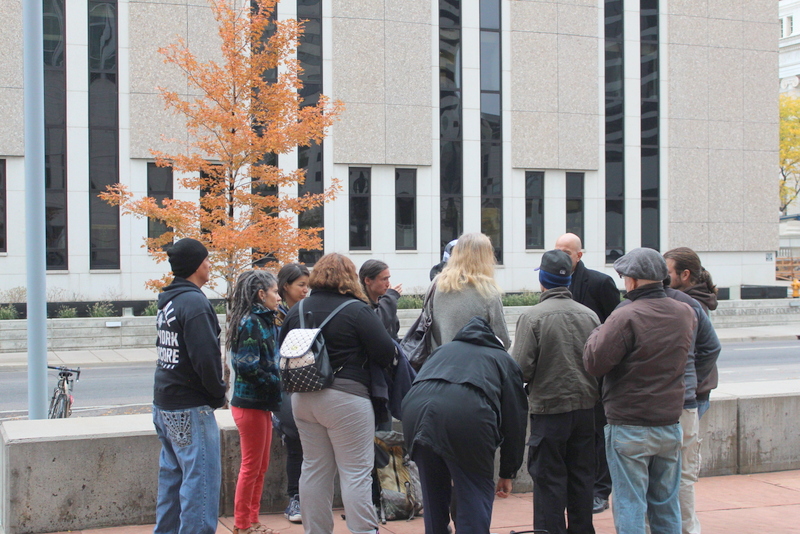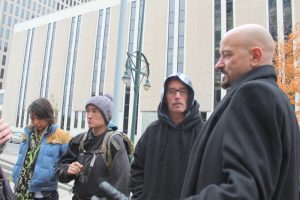
Attorney for plaintiffs Jason Flores-Williams gives plaintiffs and supporters his reaction to today’s hearing while standing outside of the Alfred A. Arraj Federal Courthouse, “Your appearance today speaks for itself.”
More people were standing than sitting in federal Magistrate Craig Shaffer’s courtroom Wednesday for the first hearing of a class action lawsuit filed on August 25, 2016 that is challenging Denver policies targeting those living on the streets.
In a rare move, Shaffer allowed those without government-issued identification to enter the federal courthouse to observe the hearing. Those who are unhoused-including some of the plaintiffs-often do not possess identification, however the lawsuit itself originated partly from the alleged confiscation of ID cards when possessions are taken by police.
After years of sweeps to move people who are living without shelter, and after having possessions confiscated in those sweeps, the suit was heard yesterday at Alfred A. Arraj US federal courthouse that plaintiffs hope will stop the sweeps and will prevent police from trashing people’s belongings. Plaintiffs say that their fundamental constitutional rights are being violated on a systemic basic.
 Attorney for the plaintiffs, Jason Flores-Williams said that he had personally witnessed cases of abuse against those living without shelter and that he felt compelled to act. Through conversations with people on the streets, he said he discovered a pattern of systemic abuse of Denver residents by Denver police acting in part on policies implemented by the mayor’s office. Denver Mayor Michael Hancock and Denver Police Chief Robert White are two named in the lawsuit as individuals along with the City and County of Denver.
Attorney for the plaintiffs, Jason Flores-Williams said that he had personally witnessed cases of abuse against those living without shelter and that he felt compelled to act. Through conversations with people on the streets, he said he discovered a pattern of systemic abuse of Denver residents by Denver police acting in part on policies implemented by the mayor’s office. Denver Mayor Michael Hancock and Denver Police Chief Robert White are two named in the lawsuit as individuals along with the City and County of Denver.
Shaffer spent much of the hearing suggesting ways to cut down the time and expense of a lengthy class action lawsuit. Those suggestions included removing Denver Mayor Michael Hancock as a defendant as well as Denver Police Chief Robert White. Shaffer cautioned that naming two officials acting in their “official capacity” would invite the two to claim “qualified immunity,” a process that could extend the length of a trial. “I have a sense of urgency myself,” Shaffer said suggesting that an extended trial wouldn’t bring a change to policies as soon as they’re needed. While Flores-Williams said that he appreciated the judge’s position and would follow it pending consultation with his clients, Gary Anderson who is a lead plaintiff said he was bothered that policymakers such as Hancock and White were “above the law.” Anderson said that policymakers are the ones who make the policies and should be held accountable and prosecuted for their actions.
Accountability to policies in the lawsuit challenge that 8th Amendment violations take place during the street sweeps and the disposing of people’s possessions. Shaffer said that he wasn’t sure that the cruel and unusual punishment element of the Amendment was applicable to the current claims because in his experience, 8th Amendment violations have referred to people who were incarcerated and not to those who are “at liberty on the streets.” Shaffer added that plaintiffs could still achieve their goals by “streamlining” their complaints that would not impact achieving class action status. A class status decision will come from US District Judge William J. Martinez is expected after the case goes forward, possibly to trial.
An amended complaint if plaintiffs choose to follow Shaffer’s advice is due by noon on October 14.
A status conference is scheduled for October 20 at 10:00 when Assistant City Attorney Wendy Shea said she plans to motion for dismissal.